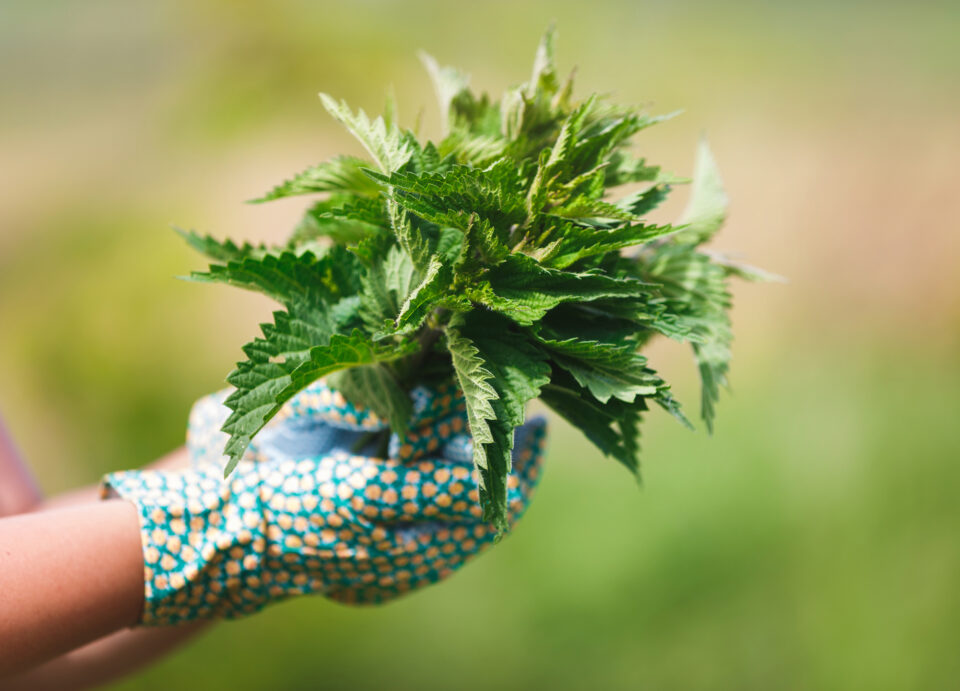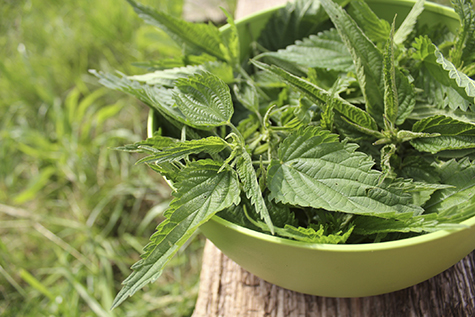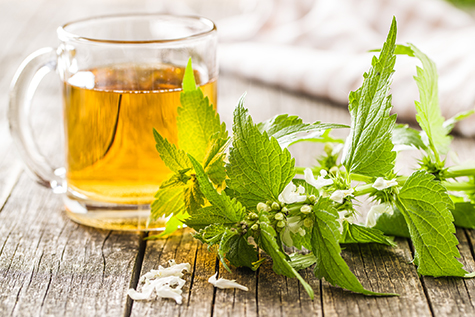Fight Allergies and Inflammation with Nettles


You may have noticed nettles growing alongside your hiking trails and avoided them because of their notorious stinging bite. But next time you’re out, think about bringing some gloves to collect them – nettles are a nutrition powerhouse! Stinging nettles are one of nature’s many superfoods so read on to learn about the nutritional and healing benefits of this medicinal plant.
Growing naturally in many areas of the world, there is good reason that nettles have been used medicinally in Africa, Asia, Europe and America for centuries. Chemical compounds have been identified in the roots, leaves and hairs of the stinging nettle plant and have been linked to antioxidant, anti-inflammatory, anti-viral, blood sugar and blood pressure lowering effects. When cooked, nettles test rich in calcium, magnesium, iron, manganese, zinc, copper, and chromium. Fresh and dried nettles also contain antioxidants such as carotenoids chlorophyll and beta-carotene as well as flavonols and tannins.
Nettles are also a source of vitamins A, B1, B2, B9, C, E, and K. Heat, either dry or wet, will neutralize the stinging part of this plan so it can be consumed in a variety of recipes and teas. They are also used in powdered or supplement form for a variety of therapeutic treatments.
Nettles are used medicinally for a many of health conditions but are perhaps best known for treating seasonal allergies. Compounds have been found in nettles that help combat the inflammation and reactivity of allergy sufferers. For example, composites in nettles appear to inhibit inflammatory pathways and also act against the histamine receptors which are responsible for allergy signs and symptoms.
Nettles are also used to treat bladder problems including enlarged prostate, irritable bladder and urinary tract infections. A specific compound in nettles, enzyme 5-alpha reductase, is associated with aiding in prostate support though research is still inconclusive on its effectiveness. Nettles, particularly extracts of the root, are also used for joint problems including osteoarthritis. The mechanism may be linked to the anti-inflammatory potential of the plant.
Safety Considerations
Keep in mind that when used in supplement form, nettles are a natural blood thinner and may interact with some medications. Nettles may have the power to decrease blood sugars and blood pressure, causing levels to dip too low for some people. Discuss the use of nettles with your doctor for safety given individual considerations. It may be difficult to correctly dose nettles in capsule form because there is no current standardization of extraction. Be sure to choose a trusted brand of supplement that has been third party tested for quality. Stinging nettles can cause intense skin irritation when fresh, be sure to use plenty of caution when handling nettles that have not yet been processed.
5 Ways to Benefit from Nettles
- Drinking nettle tea is a classic way to reap the benefit of this plant; purchase tea bags in stores or make your own if you have access to fresh leaves. Remember, processing with heat removes the stinging part of nettles so they become safe to consume.
- Blend cooked nettles into sauces such as pesto or use as a green in red sauce on pasta or risotto.
- Simply sauté nettle greens with garlic, olive oil and lemon for a nutritious side-dish.
- Try nettle soup for an antioxidant-rich summer soup. Add flavor with onion, potato, and vegetable stock.
- Add to scrambles or omelets instead of spinach as an alternative green.
How will you enjoy nettles this spring?
Enjoy our delicious Nettle Pesto Recipe Here!
Resources:
- Mahlangeni NT, Moodley R, Jonnalagadda SB. The distribution of macronutrients, anti-nutrients and essential elements innettles, Laportea peduncularis susp. peduncularis (River nettle) andUrtica dioica (Stinging nettle). J Environ Sci Health 2016;51(3):160-169.
- Natural Medicines Database. Stinging Nettle. https://naturalmedicines.therapeuticresearch.com/databases/food,-herbs-supplements/professional.aspx?productid=664. Updated 2/16/2015. Accessed 5/15/16.
- Roschek B Jr,Fink RC, McMichael M, Alberte RS. Nettle extract (Urtica dioica) affects key receptors and enzymes associated with allergic rhinitis. Phytother Res. 2009 Jul;23(7):920-6.
- Taylor-Clark T. Histamine in allergic rhinitis. Adv Exp Med Biol.2010;709:33-41.

